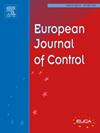Identification of piecewise constant parameters in nonlinear models
IF 2.6
3区 计算机科学
Q2 AUTOMATION & CONTROL SYSTEMS
引用次数: 0
Abstract
Many real-world dynamical systems are characterized by different temporal phases, with sudden changes in the values of the system’s parameters in correspondence to variations from one phase to another. Identifying the system’s parameters and these switching instants from potentially noisy measurements of the system’s states is a relevant problem in several applications. We here propose a novel approach for estimating the time-varying parameters of a broad class of nonlinear dynamical systems from noisy state measurements. We formulate the problem as a mixed-integer quadratic program (MIQP) including a sparsity constraint to enforce the piecewise constant nature of the parameters. Then, we develop a convex relaxation of the problem in the form of a quadratic program (QP). The solution of the relaxed convex QP and/or the sub-optimal solutions of the MIQP returned by the MIQP solvers provide us with computationally-efficient approximations that can be used effectively in those large-dimensional cases in which the solution of the original MIQP is difficult to obtain. After validating our approach in a controlled experiment, we demonstrate its potential on two real-world case studies regarding marketing and epidemiological applications.
非线性模型中分段常数参数的辨识
许多现实世界的动力系统具有不同的时间相位特征,系统参数值随相位的变化而突然变化。在一些应用中,从系统状态的潜在噪声测量中识别系统参数和这些切换时刻是一个相关的问题。本文提出了一种从噪声状态测量中估计一类非线性动力系统时变参数的新方法。我们将该问题表述为包含稀疏性约束的混合整数二次规划(MIQP),以强制参数的分段常数性质。然后,我们以二次规划(QP)的形式给出了该问题的凸松弛。松弛凸QP的解和/或由MIQP求解器返回的MIQP的次优解为我们提供了计算效率高的近似,可以有效地用于那些难以获得原始MIQP解的大维情况。在对照实验中验证了我们的方法后,我们在两个关于市场营销和流行病学应用的现实案例研究中展示了其潜力。
本文章由计算机程序翻译,如有差异,请以英文原文为准。
求助全文
约1分钟内获得全文
求助全文
来源期刊

European Journal of Control
工程技术-自动化与控制系统
CiteScore
5.80
自引率
5.90%
发文量
131
审稿时长
1 months
期刊介绍:
The European Control Association (EUCA) has among its objectives to promote the development of the discipline. Apart from the European Control Conferences, the European Journal of Control is the Association''s main channel for the dissemination of important contributions in the field.
The aim of the Journal is to publish high quality papers on the theory and practice of control and systems engineering.
The scope of the Journal will be wide and cover all aspects of the discipline including methodologies, techniques and applications.
Research in control and systems engineering is necessary to develop new concepts and tools which enhance our understanding and improve our ability to design and implement high performance control systems. Submitted papers should stress the practical motivations and relevance of their results.
The design and implementation of a successful control system requires the use of a range of techniques:
Modelling
Robustness Analysis
Identification
Optimization
Control Law Design
Numerical analysis
Fault Detection, and so on.
 求助内容:
求助内容: 应助结果提醒方式:
应助结果提醒方式:


